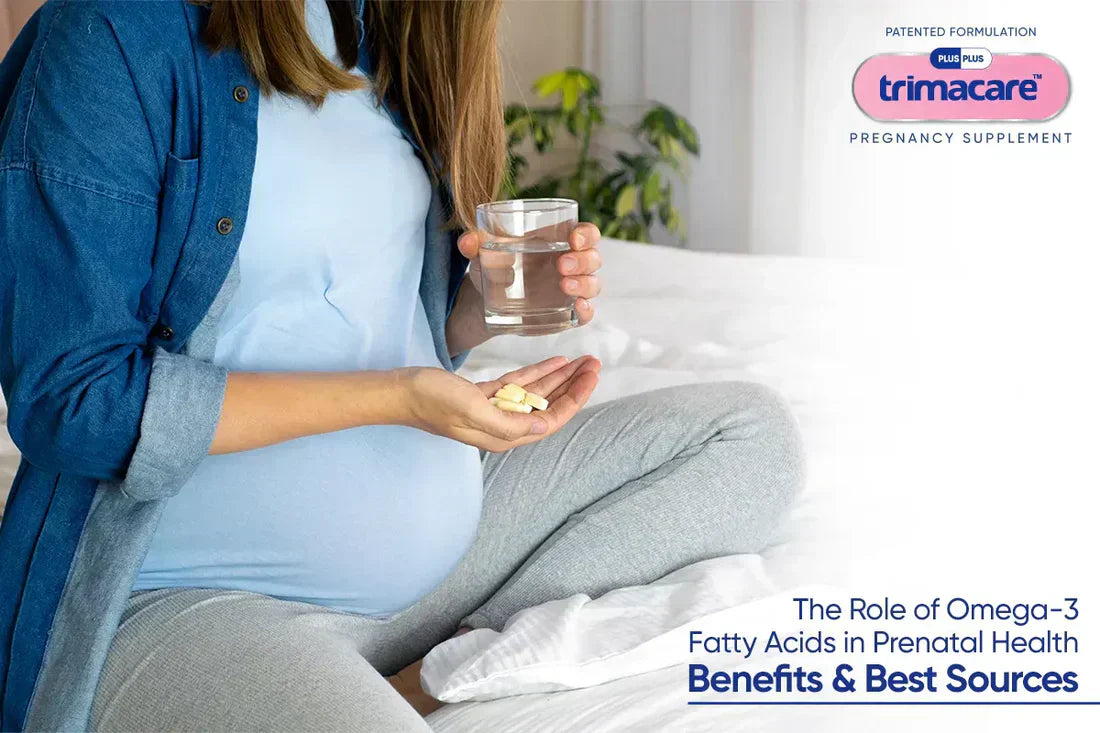
The Role of Omega-3 Fatty Acids in Prenatal Health: Benefits and Best Sources
Omega-3 fatty acids are a crucial element for a healthier pregnancy that is often overlooked. They are necessary for the optimal development of the baby's brain, eyes, and nervous system. Additionally, Omega-3 fatty acids keep the mother healthy while providing her with an array of health benefits.
Understanding the importance of omega-3 fatty acids during pregnancy is essential for positive outcomes. Adding omega-3 fatty acids to your diet has a significant impact on you and your baby’s health. Since the body cannot produce it naturally, ample amounts must be obtained through diet or omega-3 supplements for pregnant women. Consumption of adequate amounts of omega-3 is essential for the development of fetal brains and the retina, may also affect the duration of gestation, and may also serve as a preventive measure against perinatal depression.
This blog will help you explore the role of omega-3 fatty acids during pregnancy and their benefits. We will also mention the best Omega-3 pregnancy supplement for you to consume to meet your required nutritional needs.
Omega-3 Benefits During Pregnancy
Omega-3 fatty acids are essential for a healthy pregnancy, as they provide a broad range of health benefits to the mother and her little one. Some of them are:
-
Foetal Brain Development: One of the omega-3 benefits during pregnancy is the formation of a baby's brain. DHA is an essential component of omega-3 fatty acids in pregnancy, absolutely needed to construct and maintain the cellular makeup and function of the brain. Adequate intake of prenatal nutrition with omega-3 can greatly raise cognitive development, resulting in superior brain functions and higher IQ levels in the child.
- Visual Health: Omega-3 capsules during pregnancy are important in the development of the eye. DHA, a significant component of an omega-3 supplement, is a major structural element of the retina. A proper level of DHA during pregnancy supports optimal visual development in the newborn, leading to improved visual acuity and keen eyesight as the child grows.
- Reduce the Risk of Premature Birth: DHA supplements during pregnancy reduce the risk of premature birth significantly. As pregnancy approaches its third trimester, omega-3 fatty acids work as a powerful anti-inflammatory, thus ensuring that the pregnancy will be normal in minimizing risks of complications that will lead to premature labor.
- Reduced Risk of Preeclampsia: According to some research studies, omega-3 fatty acids have been proven to reduce the risk of preeclampsia, a condition marked by increased blood pressure that causes risks both for the mother and the fetus. Hence, DHA supplements during pregnancy ensure proper control over blood pressure and lead to a safer delivery of pregnancy.
- Mood and Psychological Health: Omega-3 capsules during pregnancy help improve your mood and psychological well-being. It helps prevent the risk of postpartum depression while maintaining chemical balance in the brain. Furthermore, DHA supplements during pregnancy maintain your emotional well-being so you don’t go riding the emotional rollercoaster alone.
- Heart Health: Omega-3 prenatal vitamins support your heart health by lowering inflammation and improving circulation. This is mainly important in pregnancy because the cardiovascular system changes. Adding omega-3 fatty acid supplements to your pregnancy diet helps support a healthy heart while always offering benefits for both mom and baby.
Trimacare, the Best Omega-3 Prenatal Vitamin
Trimacare leads the Indian prenatal vitamins market by being the best omega-3 capsule in India. It is packed with omega-3 fatty acids (DHA: EPA) among 20+ essential nutrients, such as calcium, vitamin D, iron, vitamin B12, L-methyl folate, zinc, etc., to support optimal pregnancy health. The prenatal supplement helps in optimal brain and cognitive development, reduces the risk of pregnancy complications like pre-term birth and pre-eclampsia, enhances mood and psychological well-being, and maintains your heart health.
Frequently Asked Questions
1. Why are omega-3 acids important during pregnancy?
Omega-3 fatty acids are essential in pregnancy. Omega-3 helps in the development of a baby’s bones, eyes, and nervous system. Also, sufficient intake of omega-3 can benefit a mother’s health by reducing the chances of postpartum depression and improving heart rate.
2. Do Omega-3s prevent preterm birth?
Omega-3 fatty acids act as an anti-inflammatory agent. Therefore, adequate Omega-3 fatty acids help to prevent several pregnancy complications, including preterm birth.
3. How much omega-3 should I take during pregnancy?
Experts recommend that a pregnant woman take at least 200 mg of DHA daily. However, the omega-3 requirement may vary depending on the pregnancy needs. It is better to consult a doctor.
4. Do omega-3s prevent preeclampsia?
According to some studies, omega-3 reduces the risk of preeclampsia, a condition in which the mother’s blood pressure is too high during pregnancy.
Pallavi Aggarwal
A Certified Nutritionist with a rich healthcare background in health journalism, the author has immense experience in curating reader-friendly, engaging, and informative healthcare blogs to empower readers to make informed pregnancy-related decisions.
- Choosing a selection results in a full page refresh.
- Opens in a new window.




